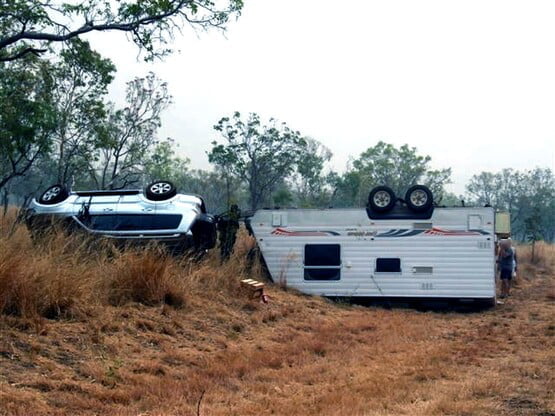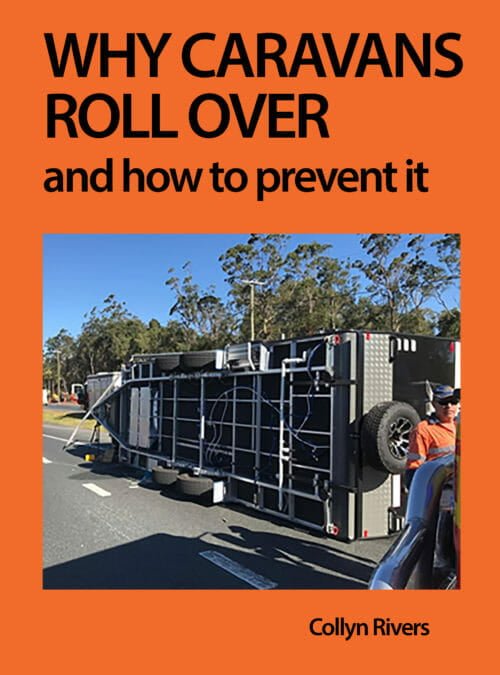by Collyn Rivers
RV industry changes needed
On the surface, the Australian RV industry is healthy. But underneath all is far from well. A great deal needs changing. There are lots to do. RV Books explains the RV industry changes needed.

Pic: NT Police
In Australia, RV registrations are growing at about 5% a year. [caravan park]s fill in peak season. Caravan and camping shows are busy. But all is not as it seems.
The industry’s main current issues
- Many consumers are unhappy about the quality of their RVs (see here and here)
- Heavy or overweight Australian caravans are common on our roads. One RV service company estimates that 90% are overweight. Police checks show over 80% of all checked are overweight. One was by over 400 kg (880 lb).
- Tow vehicles are lighter to meet emissions requirements.
- Combining a light one with a heavy caravan, however, is a recipe for a rollover.
- Towing rules vary between each state and territory.
- RV owners are confused about RV weight definitions. This is compounded by multiple industry definitions. Many have little meaning.
- RV sales talk often takes priority over safety. It has ill-defined terms such as ‘off-road’.
- RV ‘reviews’ are included as part of RV media advertising/promotional packages.
- There are no statutory minimum payloads for caravans. Those for motorhomes are inadequate.
- Despite legal rules, RV compliance plates vary in content. They often contain errors.
- There is confusion about RV ‘self-containment’. This includes what it is. And where it applies.
- Town councils and [caravan park]s combine to disallow ‘free camping’.
Caravan rollovers escalate yearly
Each is an avoidable tragedy. Many end the RV dreams of those involved. Or worse.
The causes of rollovers are now well established. So are ways to reduce them. All is explained in both plain English (plus engineering) terms in our book: Why Caravans Roll Over – and how to prevent it.
RV Books believes caravan accidents can be significantly reduced by driver education. It needs better co-ordination between RV makers, road and industry authorities and RV clubs. All need a strong focus on towing dynamics and road safety.
RV industry changes needed to do to make their products safer
Caravan manufacturers need to make lighter ‘vans of uniformly high quality. To weigh every van made and attach full and accurate compliance plates. Manufacturers should install a weighbridge or scales.
Dealers should weigh every RV sold. And use educational tools for buyers.
RV vendors to advise effective payload after all accessories are fitted. To include payload allowances in sales contracts. To clarify maximum weight allowances. Vendors to stress the dangers of towing a caravan by a vehicle that is lighter. This particularly so for caravans over five metres. RV Books advises limiting laden caravan weight. It should not exceed 80% of the laden tow vehicle’s weight. So does the Caravan Council of Australia. Why Caravans Roll Over – and how to prevent it explains all.
Summary
- RV owners need to understand and follow their weight, loading and towing equipment obligations. Also any applicable ‘long vehicle’ road rules. They should not add extra weight (particularly at a caravan‘s rear. Load tow vehicles their legal maximum. But not more. This particularly so with dual-cab utes.
- State and territory road authorities should consider a single set of national towing rules. This should include driver license endorsement for towing. This could combine computer-based tow theory and RV road rules.
- Vehicle engineers to create a dedicated set of construction rules for caravans. Not just ‘trailers’. Simplify trailer weight and compliance plate requirements. Quantify sales terms. e.g. ‘off-road’ and ‘fully insulated’. Clarify the risks and limitations of weight distributing hitches. Make smoke detectors mandatory. Set realistic payloads.
- Industry organisations to encourage and actively monitor safe, high-quality RV manufacturing processes. Promote safe towing through free road checks. Provide, consumer-friendly educational material and courses. Offer online services such as tow vehicle matching.
- Insurance companies to promote RV driver self-education. They could offer discounts to those attending towing courses. Also, offer free or subsidised weighbridge checks.
- RV media to advise readers that ‘reviews’ are paid for. Overly heavy caravan weight noted in reviews. Suitable tow vehicles proposed for trailers reviewed.
RV Books will meanwhile assist with RV driver education etc via its books and articles.




